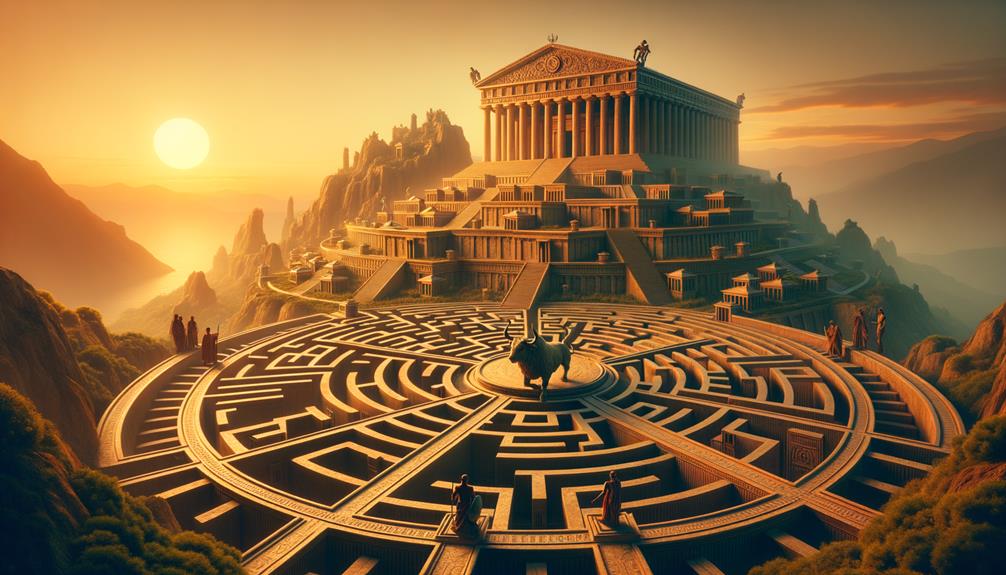The ancient Crete king Minos demanded respect and provoked fear. His lineage traced back to Zeus and Europa. Minos' wife Pasiphae gave birth to the monstrous half-man, half-bull Minotaur, imprisoned in an expansive maze. The Athenian hero Theseus confronted the beast using Ariadne's thread. Minos ruthlessly pursued the craftsman Daedalus, leading to an untimely demise in Sicily's scorching waters. Even after death, Minos presided as a judge over the deceased, his legend ingrained in mythology and the notion of justice. This mythical tale captivates with its elements of power, monstrosity, and divine origins.
Minos in Greek Mythology
In Greek mythology's vibrant tapestry, King Minos of Crete emerges as a complex figure – a lawgiver steering order, yet a tyrant embracing oppression. His reign spanned the Aegean, a chronicle of justice and cruelty intertwined.
The myth of the Minotaur encapsulates Minos' duality. Born of his wife Pasiphae's unnatural union with a bull, this monstrous offspring was confined within a labyrinth crafted by ingenious Daedalus. The Minotaur embodied the paradox of Minos' rule – both divine will and human ambition's creation.
Theseus, the Athenian hero who ventured to slay the beast, cemented Minos' legacy. Conflicts with Athens, including sacrificing youths to the Minotaur, branded him a tyrant. Yet, his association with Daedalus' brilliance underscored innovation. Thus, Minos' story weaves triumph and tragedy into mythology's rich fabric.
Family of Minos
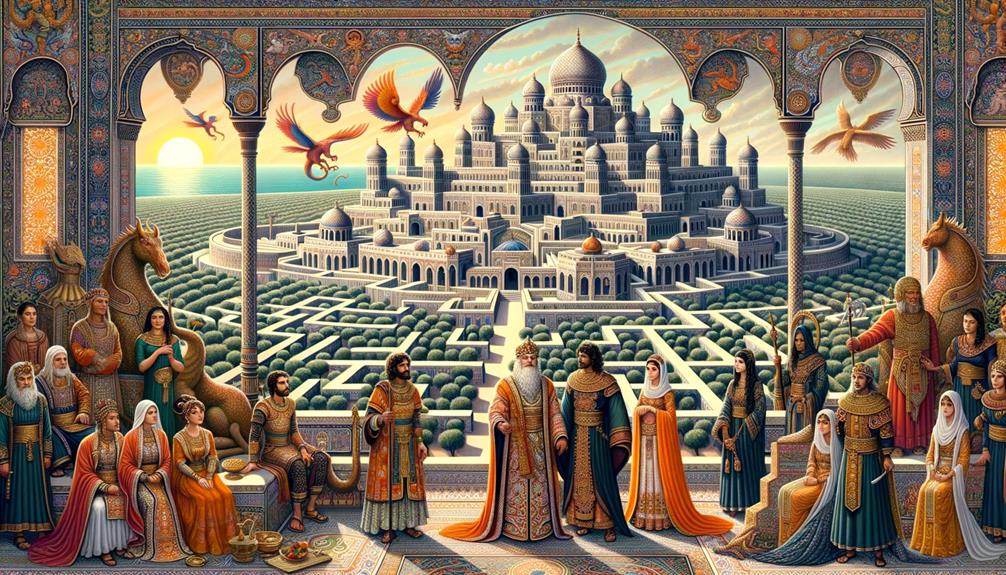
The myths surrounding King Minos and his dynasty are woven into grand tales of destiny. As the son of Zeus and Europa, Minos possessed divine lineage, while his children like Ariadne and Androgeus walked paths of heroism marred by tragedy. Their intricate stories reveal the shadows and light cast upon this epic saga.
Minos' Divine Parentage
Born to Zeus and Europa, Minos shared ancestry with immortals and mortals, launching a legendary journey. Zeus seduced Europa, disguised as a mighty bull, conceiving Minos. This union blended divine power with royal grace, granting Minos extraordinary influence as a semi-divine figure.
Minos's story interweaves symbolic threads central to Greek mythology:
- Divine Lineage: As Zeus's son, Minos held a profound connection to the gods.
- Royal Heritage: Europa's Phoenician royalty amplified Minos's prestige.
- Divine-Mortal Duality: His mixed origins allowed him to bridge realms.
- Symbolic Birth: Zeus's bull form represented virility and strength.
From these mythic origins, Minos embarked on a legacy both immortal and human, shaping his epic journey.
Siblings and Offspring
Minos navigated the tangled bonds with siblings Rhadamanthys and Sarpedon, fathering legendary figures Androgeus, Ariadne, and Phaedra. My relationship with Rhadamanthys and Sarpedon fluctuated between rivalry and kinship, shaping our trajectories. Rhadamanthys became a judicious arbiter of the dead, while Sarpedon embraced the valor of a warrior.
As a father, my lineage extended through offspring. Androgeus, my courageous son, met an untimely demise in Athens, igniting conflict. My daughters wove intricate tales – Ariadne's love for Theseus and entanglement in the Minotaur legend symbolized sacrifice and betrayal. Phaedra's tragic desire for her stepson Hippolytus highlighted humanity's complex passions.
Pasiphae, my wife, birthed our children Glaucus and Asterion, but also the dreaded Minotaur – an embodiment of my arrogance and divine retribution. Each family member sculpted Crete's mythic tapestry, their narratives echoing across time.
Reign of King Minos

Minos, blessed by the gods, governed Crete with divine authority, banishing rivals and ushering in an era of prosperity and justice. As King, his reign stemmed from Zeus himself, ensuring fairness and influence. Minos' laws set a standard coveted by other city-states.
- He constructed a formidable navy, solidifying Cretan dominance over the seas.
- His marriage to Pasiphae produced a large family, including the brave Androgeus.
- Innovative laws shaped governance during Minos' rule.
- After death, he became one of the Judges of the Dead, a role reflecting his enduring wisdom and authority.
Minos' family played crucial narrative roles. Androgeus, his valiant son, forged a heroic legacy, while Pasiphae, his wife, added mythological layers. As ruler, Minos adeptly balanced power and justice, making Crete a civilized society. Even in the afterlife as a Judge of the Dead, his authority and sagacity remained, cementing his mythical and historical significance.
The Minotaur Legend
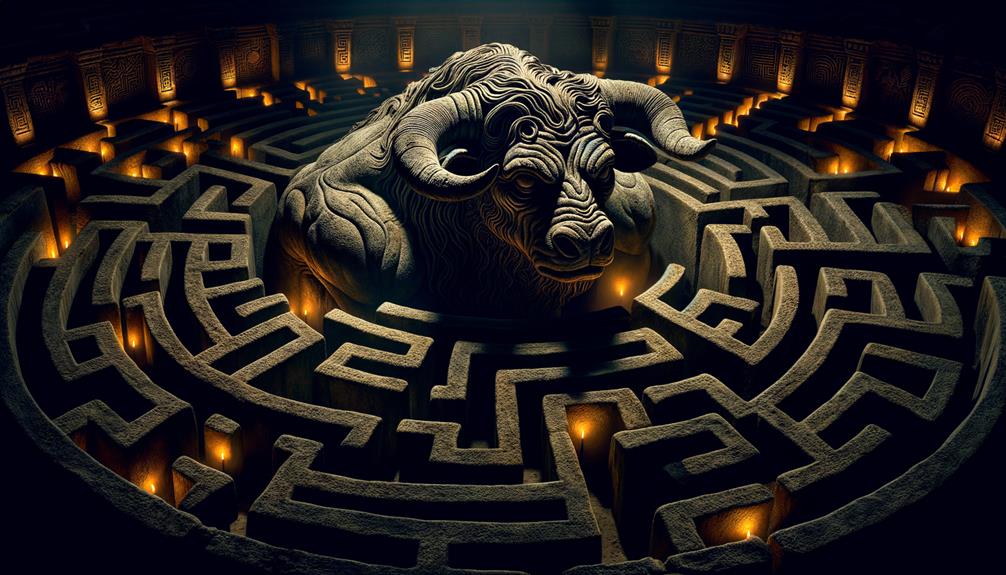
In the midst of the Labyrinth, a hideous secret lurked – the Minotaur, a monstrous fusion of man and bull. Its genesis traced back to Pasiphae's ill-fated infatuation with a magnificent white bull gifted by Poseidon. Minos, the king, appalled by this abomination, trapped the Minotaur within the intricate Labyrinth built by Daedalus, the master craftsman. To satiate the beast's hunger, Minos demanded periodic sacrifices of Athenian youth, casting a pall of dread over Athens.
From this grim shadow emerged Theseus, a valiant Athenian prince, volunteering to vanquish the terror. Aided by Ariadne, Minos' compassionate daughter, Theseus received a thread to guide him through the Labyrinth's labyrinthine passages. This symbolic lifeline represented hope and love, illuminating his path through darkness.
In an epic confrontation, Theseus challenged the Minotaur and emerged victorious, slaying the beast and ending the grim cycle of sacrifices. The Labyrinth, symbolic of human complexity and divine retribution, stood as a monument to bravery and ingenuity. The Minotaur legend, replete with themes of sacrifice, heroism, and the repercussions of divine curses, remains a pivotal thread in the tapestry of Minos' storied reign.
Death of King Minos
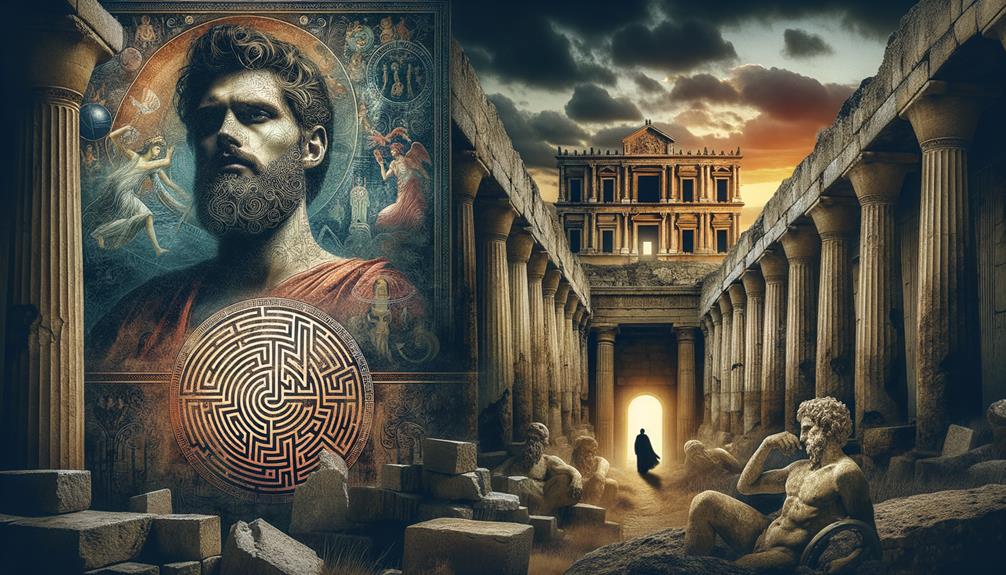
King Minos' relentless hunt for Daedalus ultimately doomed him in Sicily. While King Cocalus appeared hospitable, his warm welcome concealed a deadly trap – a scorching bath that claimed Minos' life. This treacherous act not only ended his reign but also transformed him into an underworld judge, forever etching his story into the mythological fabric.
Minos' Fatal Pursuit
Minos pursued Daedalus with single-minded intensity, his ambition sealed by King Cocalus' clever daughters and a steaming bath – a tragic conclusion to his rule. Spurred by vengeance, Minos hunted Daedalus tirelessly across the seas. His chase led him to Sicily, where Daedalus sought sanctuary under Cocalus' protection. Minos' relentless pursuit met a fatal snare.
Underestimating Cocalus' daughters' guile, Minos fell victim to their ruse – a scalding bath that claimed his life, marking the once-mighty Cretan king's downfall. This tale encapsulates:
- Unrelenting Pursuit: Minos' unwavering chase of Daedalus.
- Deception: The cunning ploy of Cocalus' daughters.
- Tragic Demise: The fatal conclusion in boiling water.
- Poetic Justice: Retribution for Minos' consuming vengeance.
Consumed by obsession, Minos succumbed to the destructive force he unleashed. The boiling bath symbolizes vengeance's corrosive power. Ultimately, his fatal pursuit of Daedalus wasn't just a chase across lands and seas but a path to his own tragic undoing, wrought by the very cunning he aimed to outwit.
Cocalus' Deceptive Hospitality
Through King Cocalus' devious scheme, Minos' relentless pursuit of Daedalus met a grim conclusion – a scalding death in a treacherous bath. Crete's formidable ruler had chased the brilliant inventor to Sicily, determined to harness his talents once more. However, Cocalus recognized an opportunity to protect his guest while eliminating Minos' growing influence.
Presenting Minos with a perplexing riddle involving a seashell, Cocalus lured the unsuspecting king into a trap under the guise of hospitality. Trusting his Sicilian host, Minos naively entered the bath, anticipating soothing waters. Instead, he was met with excruciating heat as the boiling water consumed him, sealing his tragic demise.
This event marked the end of Minos' reign and his pursuit of Daedalus. Cocalus' deception not only saved his guest but also exemplified the lengths some would go to counter oppressive rulers. King Minos' downfall, orchestrated by his own hubris and misplaced trust, serves as a stark reminder of the perils accompanying unchecked power and authority.
Scalding Bath Demise
Minos pursued Daedalus across the seas, eventually landing in Sicily where King Cocalus presided. Cocalus schemed to eliminate the persistent Minos, luring him into a scorching bath under false pretenses. The searing water proved fatal, ending Minos' relentless hunt for Daedalus.
Cocalus devised the trickery to shield Daedalus from Minos' wrath. The heated bath served as both a cleansing ritual and the catalyst for Minos' demise. This pivotal moment solidified Minos' legacy in Greek lore as a cautionary tale against obsessive vengeance and the inescapable nature of fate.
Minos in Afterlife
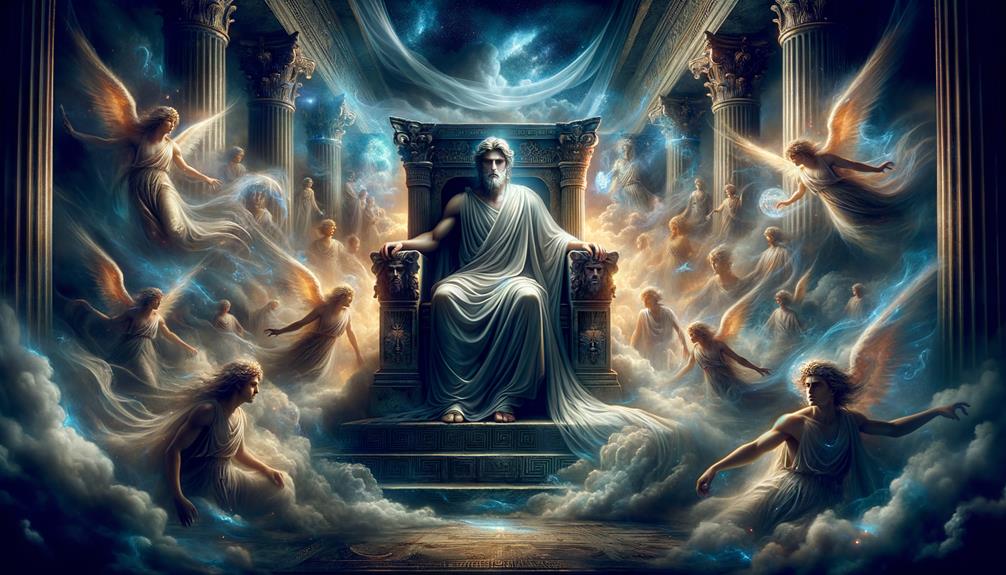
When Minos reached the underworld, he slipped into the respected role of judging souls with steadfast fairness. Greek tales paint him as one of three Judges of the Dead alongside Aeacus and Rhadamanthus. This trio had supreme power in determining the eternal fates of those who shuffled off this mortal coil.
Minos' formidable reputation from his earthly reign carried over to the afterlife. As top judge, his vote settled any disputes, reinforcing his unquestioned authority. Judging souls marked more than an extension of his kingship; it solidified his legacy of moral conviction.
In the shadowy underworld, Minos' rulings inspired both awe and trepidation. His verdicts mirrored life's complexities, shaped by an uncompromising pursuit of justice. The afterlife became his stage for sentencing destinies.
Thus, the Minos mythos transcended mortality, enshrining him in Greek lore as an eternal arbiter of fate's twists and turns.
Frequently Asked Questions
What Is the Legend of King Minos?
King Minos, born from Zeus himself, ruled over Crete with a firm yet formidable hand. His kingdom constructed the infamous Labyrinth, home to the fearsome Minotaur, demanding sacrificial tributes. Minos' reign elevated to legendary status, representing themes of power, sacrifice, and divine judgment.
Who Is the Legendary King of Crete?
The legendary king of Crete sparks intrigue through ancient myths and heroes' travels. Minos, Zeus's son, embodies both justice and tyranny in Greek folklore, his labyrinthine tales and symbolic reign intertwining epic feats with complex moral themes.
What Was King Minos Secret?
King Minos concealed a dark secret – the Minotaur, a monstrous offspring from his wife's unnatural union with a divine bull. Confined within an elaborate maze, this fearsome creature embodied the kingdom's sinister underbelly, challenging even the bravest heroes like Theseus. The twisted tale unraveled the depths mortals would plunge in defiance of sacred boundaries.
Was King Minos of Crete a Respectable Ruler?
King Minos ruled Crete like any skilled monarch – with a firm yet judicious hand. Taking guidance from Zeus himself, he crafted fair laws that earned respect across city-states. Even after death, serving as a Judge of the Underworld highlighted his lasting repute for impartiality.
While powerful, Minos never flaunted his authority arrogantly. His legal code promoted equity, shaping the very backbone of Cretan society. Tales still recounted today depict him as a principled sovereign who prioritized justice above all. Though accounts from that era remain fragmentary, glimpses reveal an able administrator adept at upholding order on the unruly island.

